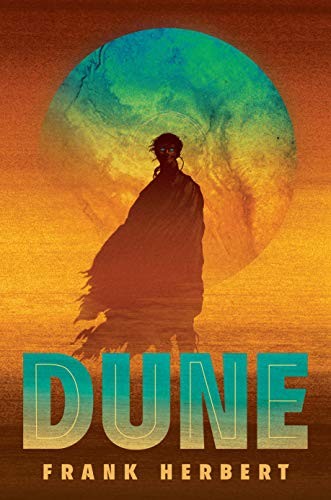Frecklemaid reviewed Dune by Frank Herbert
Review of 'Dune' on 'Goodreads'
5 stars
Strengths
Dune, put simply, defines 'Space Opera'. The scope and depth of the world that Herbert was able to present within these pages is simply remarkable. Providing a strong contrast to The Wheel of Time, another often lauded titan of world building, I felt that I had begun to understand the world, its scale and cultures, within the first half of the book. Yet, I remain cognisant of the fact that there is so much more to explore. Throughout Dune we explore the cultures of the Fremen, the Atreides and the Harkonnens to some depth, but this is coupled with an incredible political and religious system. The world felt real.
A clear dichotomy between men and women, and their roles, is demonstrated with consistency throughout Dune. However, that is not to say that the book is lacking in either male or female powerful characters. Rather, Herbert demonstrates great mastery of both feminine and masculine power (at least, within the context of this world.) The Bene Gesserit represent a subtle, feminine power through politic, deception and hidden control. This is embodied in the character of Jessica, whose choices throughout the novel arguably cause most of the events, even though she never asserts her power physically. This discipline is contrasted with the Mentats, who are shown to attempt cold, overt rationality, and the male house and tribal leaders, who are shown to prefer physical aggression in attempts to gain and maintain power. Herbert's use of these gender differences throughout the novel provides a great sense of intrigue and complexity, as it was rarely clear who is actually driving the events.
Weaknesses
Though I did give this book 5 stars, I do recognise that some aspects were weaker than others. Firstly, the 'bad guys' opposing our protagonist(s) were basically the most campy archetypal 'bad guys' you could get. They raped young boys, held gladiator fights and killed family members. Weirdly, the 'good guys' didn't exactly contrast this cartoonish representation, as great complexity was shown in their virtue and motivations. Secondly, the pacing was also a little odd, with the last third of the book seeming to contain far more action that the first two. And finally, since the Dune was written in the 60s, there are definitely some characterisations and writing styles that are starting to show their age to a modern reader, but I think that going into the book with the awareness that it was written in the 60s pretty much negates any of those anachronisms.

